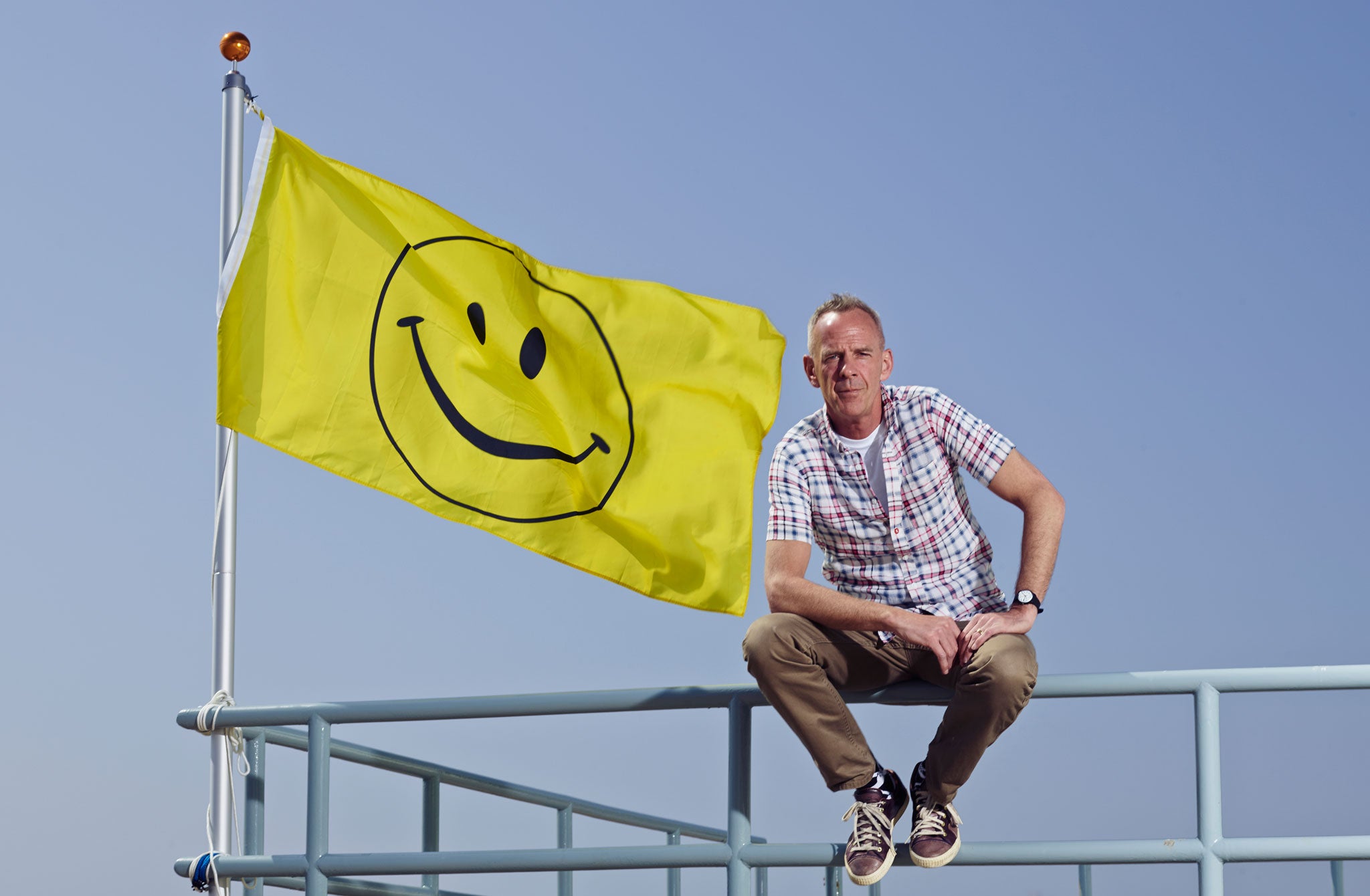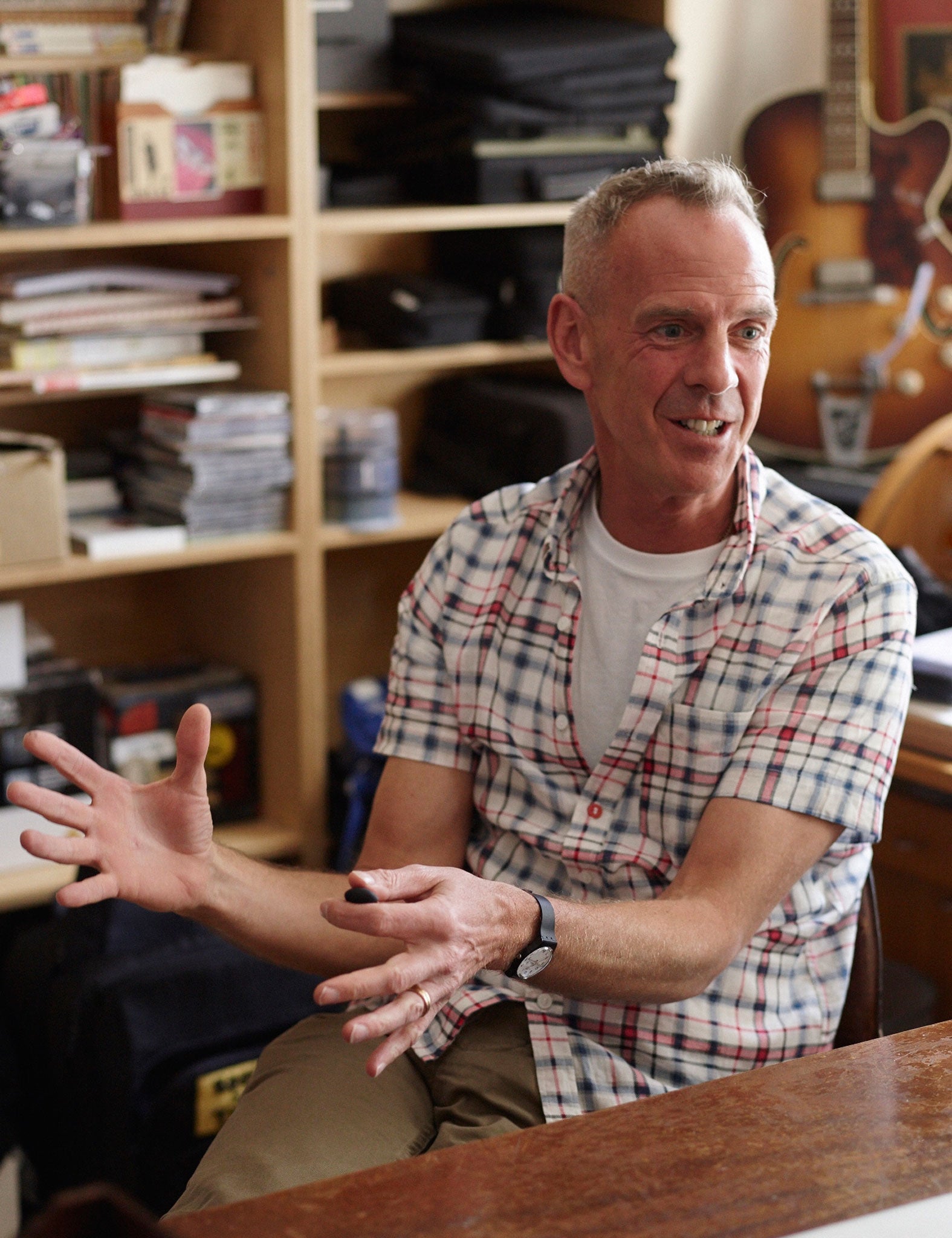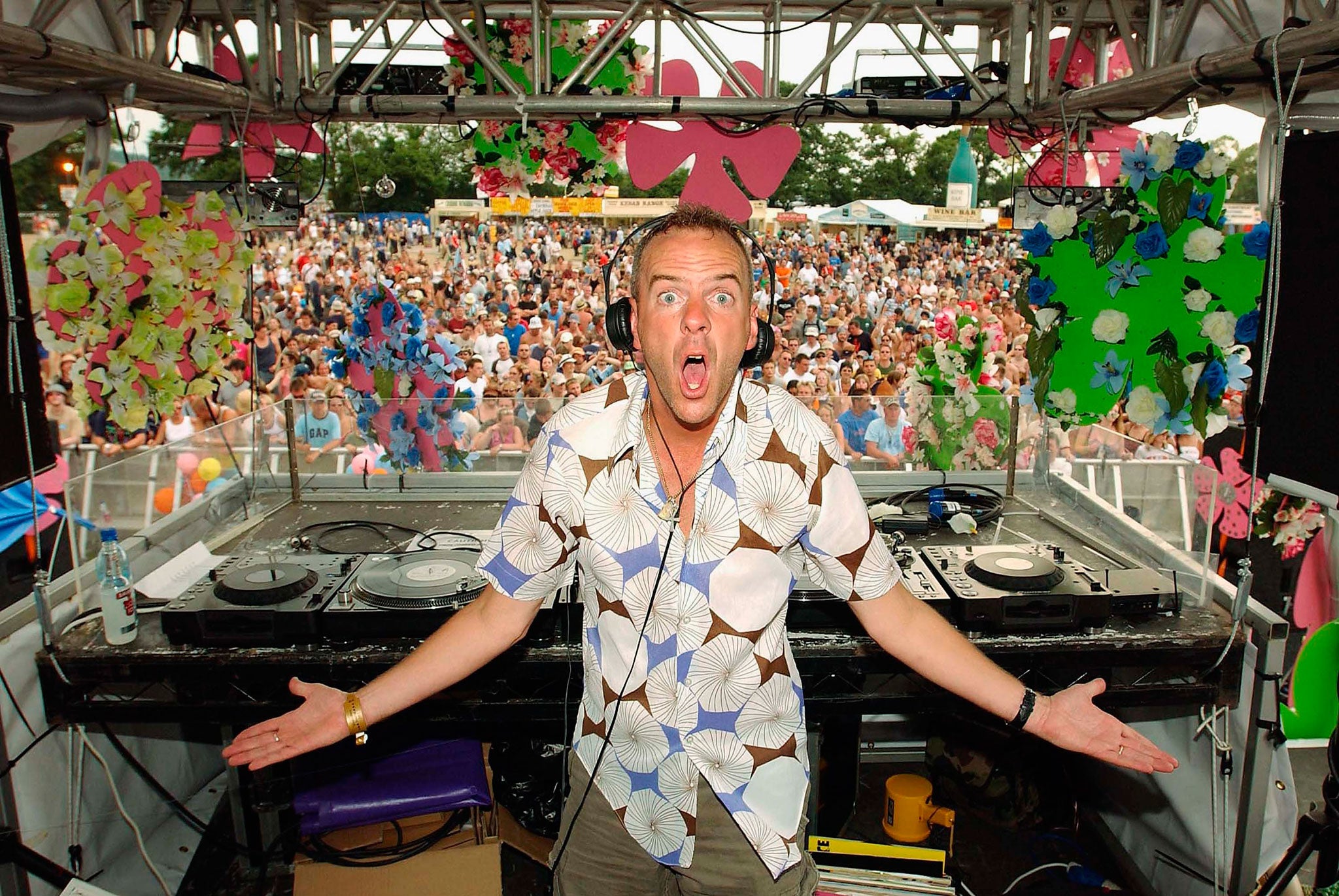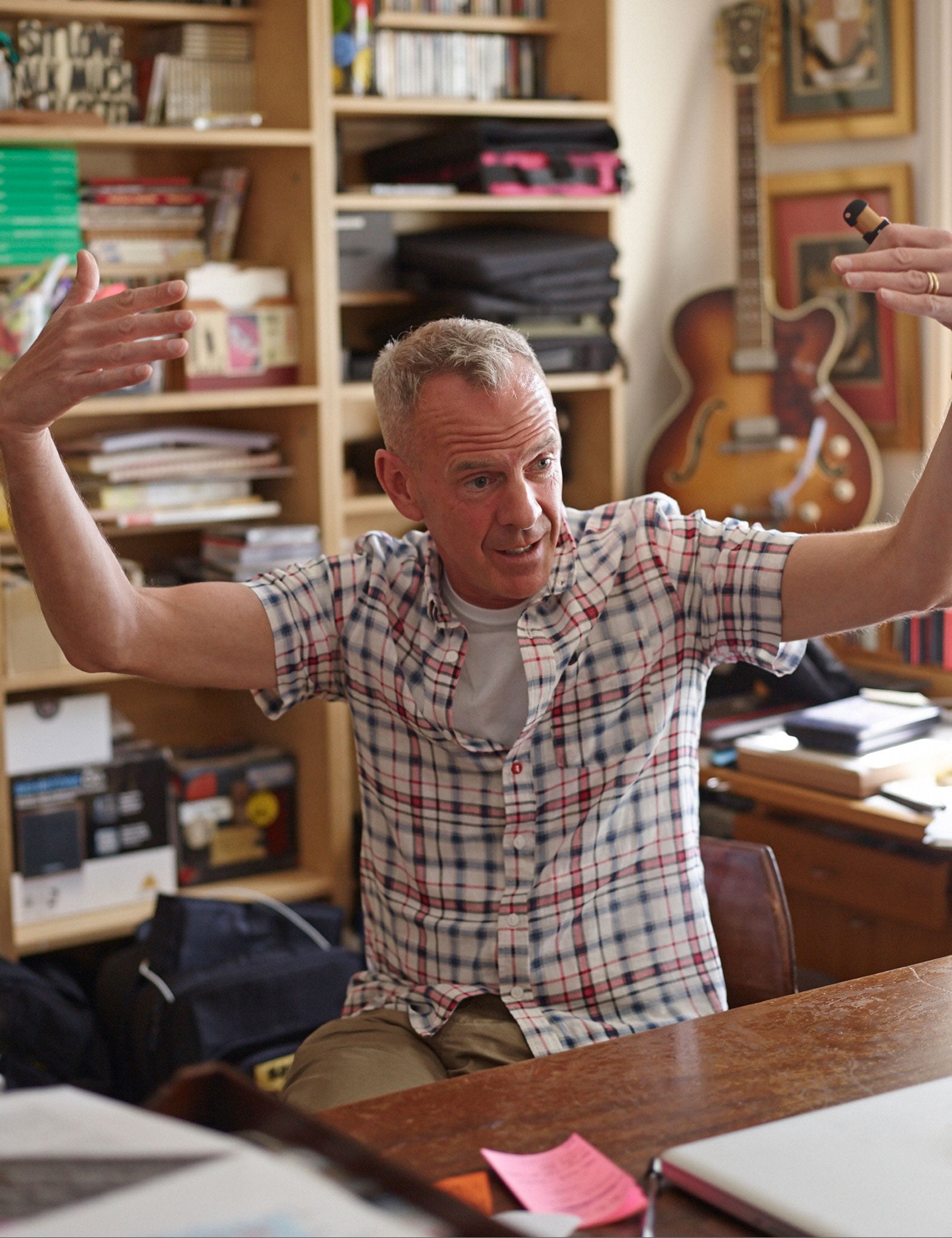Fatboy Slim: The superstar DJ who bounced back from rehab reveals secret of the five Fs
Fatboy Slim was topping the charts, playing to 350,000 in Rio, and one half of Cool Britannia's most talked-about couple. Then came marital trouble and a spell in rehab. So how does a 51-year-old family man keep the plates spinning as a superstar DJ?

Your support helps us to tell the story
From reproductive rights to climate change to Big Tech, The Independent is on the ground when the story is developing. Whether it's investigating the financials of Elon Musk's pro-Trump PAC or producing our latest documentary, 'The A Word', which shines a light on the American women fighting for reproductive rights, we know how important it is to parse out the facts from the messaging.
At such a critical moment in US history, we need reporters on the ground. Your donation allows us to keep sending journalists to speak to both sides of the story.
The Independent is trusted by Americans across the entire political spectrum. And unlike many other quality news outlets, we choose not to lock Americans out of our reporting and analysis with paywalls. We believe quality journalism should be available to everyone, paid for by those who can afford it.
Your support makes all the difference.Inside the house that rave built, all is sunshine and calm: UV rays are flooding through the huge windows of Norman Cook's beachfront abode in the bit of Brighton known as Millionaire's Row.
At one end of the long home is an office-cum-studio-cum den. This is where Dad "constantly pumps out house music" while Woody, 14 – Cook's son with radio/TV presenter-wife Zoë Ball – does his homework and plays his computer games. At the other end, what previous generations would call a "good room", an immaculate parlour – albeit one accessed via a cabinet chock-full of Brit and MTV Awards, and another cabinet spilling over with smiley-faced tchotchkes.
Trophies and acid-house signifiers: the man known as Fatboy Slim used to make a serious habit of collecting both. Now 51, he just collects smileys, and is all the happier for it. A spell in rehab and a midlife crisis of a paradoxically positive hue can do that for a bloke.
It's a warm and cool family home. Hipster art jostles for wall space with drawings done by his daughter, Nelly, five. And it's where Cook likes to spend as much time as possible – all the while maintaining a Third Act musical career that seems both thoroughly enjoyable and eminently sensible. Sensible, certainly, in comparison with how he used to run his show.
As Cook chirpily discusses the perils of living right on the sea ("The waves went over the roof!"), we talk about the locals. Sir Paul McCartney may no longer be a neighbour, but Adele still is (although Cook has barely ever seen her). Who lives next door? "Oh, that's mine too," the DJ/producer/songwriter says entirely casually. He has a recording studio in there, and some understanding tenants.
Not pictured: the restaurants and cafés he owns in the town and in New York, the stadium of Brighton & Hove Albion of which he is a major shareholder, and the about-to-be-unveiled open-air amphitheatre into which he has charitably invested. At the millennial height of his pop-star fame – a sequel to his indie mid-1980s fame as a member of the Housemartins – Fatboy Slim's business was creating crunchingly effective dance-floor anthems: "Praise You", "Right Here Right Now", "The Rockafeller Skank", "Weapon of Choice", his chart-topping remix of Cornershop's "Brimful of Asha". And business, as his home(s) and business portfolio attest, was very, very good.

But a few years ago, Cook had an epiphany. "You look at people like Madonna and it's never enough," states this tall, lean, healthily tanned geezer whose male pattern balding appears to have frozen in time about 20 years ago. We're sitting in his office (that is, the place where he keeps lots of vinyl), either side of a desk. He's never much liked interviews, and indeed is a little agitated today, not least because this is his first one in a while. But, gregarious to a fault, he soon relaxes into it.
"They always want more fame and more success and to do bigger gigs," he continues. "Nowadays I'd rather go sideways than up. I don't want to do things on a bigger scale. I want to do things that are interesting."
Hence, nine years after his last "artist" album (a Fatboy Slim greatest hits), here is a busily eclectic brace of new projects. There's a remix of Mark Ronson's "Uptown Funk", created with actor Idris Elba, and the first of the pair's planned musical collaborations. There's a series of summer shows, including his 15th consecutive Glastonbury, at which he will unveil a feelgood disco-circus concept called the Smile High Club. There's a new four-disc compilation, The Fatboy Slim Collection. And there's the ongoing collaboration with David Byrne, Here Lies Love – the stage musical about Imelda Marcos, recently nominated for three Olivier Awards.
Enjoy unlimited access to 100 million ad-free songs and podcasts with Amazon Music
Sign up now for a 4 month free trial (3 months for non-Prime members)
Enjoy unlimited access to 100 million ad-free songs and podcasts with Amazon Music
Sign up now for a 4 month free trial (3 months for non-Prime members)

"Gig-wise, have you been briefed on the five F's?" he asks. His management had given me some detail on Fatboy Slim's busy-busy summer 2015. But no, nothing about any F's.
"So, my agenda," he begins eagerly, "is: I do about 70 shows a year. I could probably do 300. But they have to fulfil three of the five f's: a first – something I've never done before. A favour for a friend, whether a promoter or another DJ. Fun – Glastonbury is always fun. Finance – it's a big payer. And food. I've booked gigs in certain places just so I can go to certain restaurants. I played in Barcelona so I could go to El Bulli. That was my rider. We did the same with Noma in Copenhagen."
For this committed homebody and foodie, the alternative – taking all those bookings – doesn't bear thinking about. "Trotting out the same thing over and over again is boring. And I have no ambition to be higher than a certain level. Cos everything that comes with it just becomes a ballache."
The last time I met Cook, everything about him and his world was – to use the old club culture vernacular – large. It was 2004, and we were in Brazil. Fatboy Slim was playing a gig on a Rio de Janeiro beach. I stood on his stage and marvelled at the sea of humanity stretching before and around us, dancing their flip-flops off. The next day, the local newspapers estimated that 350,000 fans had turned up. He was in his element, especially with his habitual gig crutches to hand: his Hawaiian shirt uniform that he wore (and still does) on every booking, and the flagons of vodka and orange that he glugged with a raging thirst. "Still the biggest gig of my life," reflects Cook with a wistful air.
That era was Fatboy Slim's imperial phase. He was the go-to guy for floor-filling tunes, a key figure in Britain's exploding club culture, a peer of the Chemical Brothers, Basement Jaxx, Underworld, Groove Armada and Leftfield. All are represented on The Fatboy Slim Collection. Then there was his relationship with Ball. They were the It Couple (or, one of them) of Cool Britannia, and everything was peachy. At least, it seemed to be.

Amid that clubby, celebrity whirl, did he have time to stop and savour moments like Rio?
"I did," he begins. "But that was during my drinking days. So the memories are hazy and [only] bits come back. But, yeah, there were tons of moments where I did think, 'F**k me, this really is happening…' The week I got engaged to Zo, the album [1998's You've Come A Long Way, Baby] knocked Robbie Williams off the top of the charts and I won a Brit [for Best British Dance Act]. Everything we did was in the tabloids and in Heat magazine. And I thought, 'Shit, this is proper famous now!'"
Something had to give, and give it did, around the time of the birth of the couple's first child, Woody. "Things were so mental at that time. We both consciously took our foot off the pedal with our career. I've always said it's much more fun being Number Nine in the charts than Number One. And especially for our private lives, being A-list tabloid fodder didn't agree with us at all."
They slowed down their lives. And six years ago, they stopped the partying.
"I went to 28 days of boot-camp rehab in Bournemouth. Not the Priory option – it wasn't fancy-pants at all. I shared a squat with junkies. Well, not a squat, student digs. But [it was] short sharp shock – this is where you are, and this is how you stop drinking."
What made him want to stop? "It wasn't fun any more. I was worrying about it affecting my health and my relationship with my family and my wife. And Zoë had an epiphany one particularly raunchy three-day bender over New Year's. Then she stopped. And after about a month of her being sober and me not, it became apparent that our relationship wasn't going to last with that imbalance!" he says, smiling.
To aid his recovery, he ran the Brighton marathon, and now undertakes two half-marathons a year, while also putting in the gym hours. "But I don't want to be the poster boy for sobriety in club culture," he insists, aware that that's a different kind of boring. "I gave up because I'd had enough. I gave it 30 good years. I caned the arse out of it and left no stone unturned. But I would encourage everyone to have as much as fun as possible – while it is still fun."

Being fit means this middle-aged man can maintain a judicious version of the DJ's itinerant, twilight existence. And it's a work routine that fits with his recalibrated sense of priority. "As a DJ, it's a series of engagements all through the year, and mainly at weekends. So I'm at home during the week, doing the school run."
And if he looks after the business, the business looks after him. As one of the first generation of superstar DJs, Fatboy Slim is merrily spinning into a tomorrow where the turntablist ringmasters of youth culture will never, he reasons, be pensioned off. "This is a job for life. Because there will always be an endless supply of young people who want to get high and get laid. And also, DJs are not like footballers or pop stars – we don't have a shelf life based on our age. Cos DJ were never really pin-ups…"
Apart from Calvin Harris in his Armani pants.
"Well, that is the new generation," he acknowledges. "But the first wave of the big DJs – Oakie [Paul Oakenfold], Pete Tong, Carl Cox, myself – we don't know what the retirement age is. And no one seems to have noticed that we're old, cos they don't have posters of us on the wall. As long as we can make it to gigs, stay up till 6am, and provide the service, no one seems to care how old we are. Which is good!" he beams.
"So," concludes smile-high Norman Cook, "I'd say boy bands seem to have the shortest shelf life – and DJs appear to have the longest." He beams again. "Best job in the world."
'The Fatboy Slim Collection' is out on 25 May on Sony
Join our commenting forum
Join thought-provoking conversations, follow other Independent readers and see their replies
Comments